Appeals for GCSE, AS and A level: summer 2020
Published 17 December 2020
Applies to England
1. Provisional appeals for GCSE, AS and A level: summer 2020
This report presents figures for the number of appeals made during summer 2020 in England for GCSE, AS and A level qualifications. It also gives information on the provisional number of qualification grades challenged and changed due to those appeals. These figures are provisional as at 17 November 2020 when the data was submitted by exam boards to Ofqual. The final number of appeals, grades challenged and changed are expected to change and will be published at a later date.
Exams were cancelled in summer 2020 following the closure of schools and colleges to most students, as part of the response to the coronavirus (COVID-19) pandemic. As part of the exceptional arrangements for exam grading and assessment in 2020, students ultimately received the higher of a centre assessed grade or calculated grade for GCSE, AS and A level. Following consultation, we published the grounds on which a school or college could submit an appeal to an exam board in summer 2020. There were additional grounds for appeals in summer 2020, including where the exam board did not apply its procedures properly and fairly or where the data used by the exam board to calculate results contained an error. Examples of the sorts of errors that the data could contain include the following:
- the head of centre has evidence that the school or college made a mistake when submitting the centre assessment grades to the exam board
- the head of centre has evidence that the exam board introduced an error into the centre assessment grade data submitted to it or when it communicated a grade
- the exam board used the wrong data when statistically standardising some students’ results
A student could not appeal because they disagreed with their school or college’s professional judgement of the grade the student would most likely have achieved if exams had taken place.
Due to the exceptional nature of the appeals process in summer 2020, direct comparisons of appeals in summer 2020 and previous years will not be valid and need to be treated with caution.
2. Total number of appeals received, upheld and leading to a grade change
In summer 2020, an appeal could be submitted by a centre on the grounds that the exam board did not apply its procedures properly and fairly or where the data used by the exam board to calculate results contained an error. An appeal can represent one candidate, or several, if related to the same potential issue.
For summer 2020 the standard post-results service was not available and there was a new appeals process, which consisted of two stages. The appeal could have been upheld at either an initial review or an independent review, and this may have led to a change in one or more qualification grades involved. If an appeal which progressed to an independent review was not upheld but was upheld at an initial review, the appeal as a whole is reported as upheld.
Due to the exceptional nature of the appeals process in summer 2020, direct comparisons of appeals in summer 2020 and previous years are not valid and need to be treated with caution.
2.1 GCSE
The number of appeals received, appeals upheld and appeals leading to grades changed has increased sharply for GCSE in summer 2020 reflecting the different nature of the appeal arrangements in summer 2020

The percentage of appeals upheld has increased for GCSE in summer 2020 reflecting the different nature of the appeal arrangements in summer 2020

Table 1: The number of appeals received, appeals upheld and appeals leading to a grade change at GCSE from summer 2017 to summer 2020
| Exam Series | Appeals received | Appeals upheld | % of appeals upheld | Appeals leading to a grade change |
|---|---|---|---|---|
| June 2017 | 270 | 100 | 36% | 65 |
| June 2018 | 480 | 255 | 54% | 145 |
| June 2019 | 745 | 425 | 57% | 270 |
| June 2020 | 2,215 | 1,835 | 83% | 1,755 |
The number of GCSE appeals increased from 745 in summer 2019 to 2,215 in summer 2020. The number of appeals upheld increased from 425 in summer 2019 to 1,835 in summer 2020 and the number of appeals upheld which led to a grade change has increased from 270 in summer 2019 to 1,755 in summer 2020. The percentage of appeals upheld in summer 2020 has increased (83%) compared with 57% in summer 2019.
The changes between summer 2019 and summer 2020 reflect the difference in the appeals process in summer 2020. Direct comparisons between years are not valid and need to be treated with caution.
2.2 GCE (AS and A level)
The number of appeals received, appeals upheld and appeals leading to grades changed has increased sharply for GCEs in summer 2020 reflecting the different nature of the appeal arrangements in summer 2020

The percentage of appeals upheld has increased for GCE in summer 2020 reflecting the different nature of the appeal arrangements in summer 2020

Table 2: The number of appeals received, appeals upheld and appeals leading to a grade change at GCE from summer 2017 to summer 2020
| Exam Series | Appeals received | Appeals upheld | % of appeals upheld | Appeals leading to a grade change |
|---|---|---|---|---|
| June 2017 | 325 | 160 | 50% | 95 |
| June 2018 | 370 | 145 | 39% | 70 |
| June 2019 | 480 | 250 | 52% | 150 |
| June 2020 | 1,355 | 1,040 | 77% | 995 |
The number of GCE appeals increased from 480 in summer 2019 to 1,355 in summer 2020. The number of appeals upheld increased from 250 in summer 2019 to 1,040 in summer 2020 and the number of appeals upheld which led to a grade change has increased from 150 in summer 2019 to 995 in summer 2020. The percentage of appeals upheld in summer 2020 has increased (77%) compared with 52% in summer 2019.
The changes between summer 2019 and summer 2020 reflect the difference in the appeals process in summer 2020. Direct comparisons between years are not valid and need to be treated with caution.
3. Nature of appeals
In summer 2020 an appeal could be made for a range of reasons:
- Procedural inconsistencies - where the exam board did not apply procedures consistently or procedures were not followed properly and fairly.
- Incorrect result issued - where a result generated by applying the process set out under Condition GQCov3.2(a)(i) was incorrectly issued by the exam board in respect of one or more learners.
- Centre error - the centre provided the exam board with incorrect data.
- Incorrect dataset – AO error - where the exam board used an incorrect data set.
- Error introduced by AO - the exam board introduced errors into a specified data set.
- Exceptional factor - in exceptional circumstances, the centre established an exceptional factor that undermined the assumption that using a default data set for statistical standardisation was the most likely to lead to consistent results.
All of these grounds for appeals did not exist in previous years and therefore comparisons on the nature of appeals of summer 2020 with previous years are not possible.
3.1 GCSE
Centre error was the most common ground for GCSE appeal in summer 2020 with 2,060 appeals

Table 3. Nature of GCSE appeals
| Nature of appeal | Number of appeals received |
|---|---|
| Centre error | 2,060 |
| Error introduced by AO | 20 |
| Exceptional factor | 55 |
| Incorrect dataset - AO error | 60 |
| Incorrect result issued | 20 |
| Procedural inconsistencies | 10 |
3.2 GCE
Centre error was the most common ground for GCE appeal in summer 2020 with 1,235 appeals
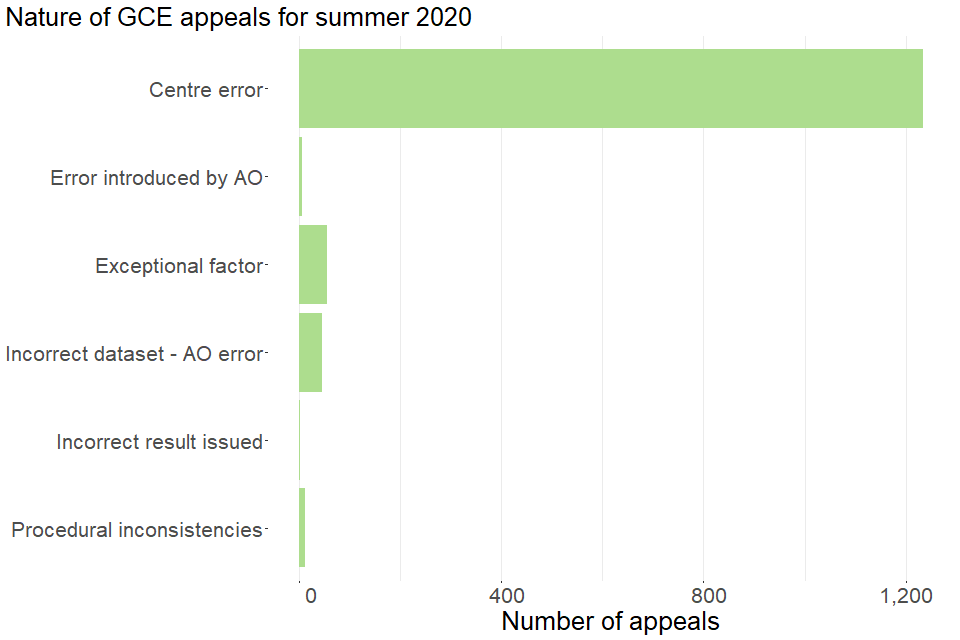
Table 4. Nature of GCE appeals
| Nature of appeal | Number of appeals received |
|---|---|
| Centre error | 1,235 |
| Error introduced by AO | 5 |
| Exceptional factor | 55 |
| Incorrect dataset - AO error | 45 |
| Incorrect result issued | 0~ |
| Procedural inconsistencies | 10 |
4. Initial reviews and independent reviews
For summer 2020 results, the standard post-results services were not available. Instead there was a new appeals process, consisting of two stages:
- An initial review, in which a suitable member of an exam board’s staff checked the relevant data, procedure or process depending on the nature of appeal.
- An independent review. If a centre was not satisfied with the outcome of the initial review, they had 14 calendar days from the outcome to request an independent review. The independent review was carried out by an independent decision maker (i.e. someone who has not been directly employed by the awarding body, was not an examiner or moderator working for the awarding body and was not connected to the awarding body in any other way).
Due to the differences of the summer 2020 appeals process comparisons with previous years are not possible.
Around 75% of all appeals received in summer 2020 resulted in a grade change
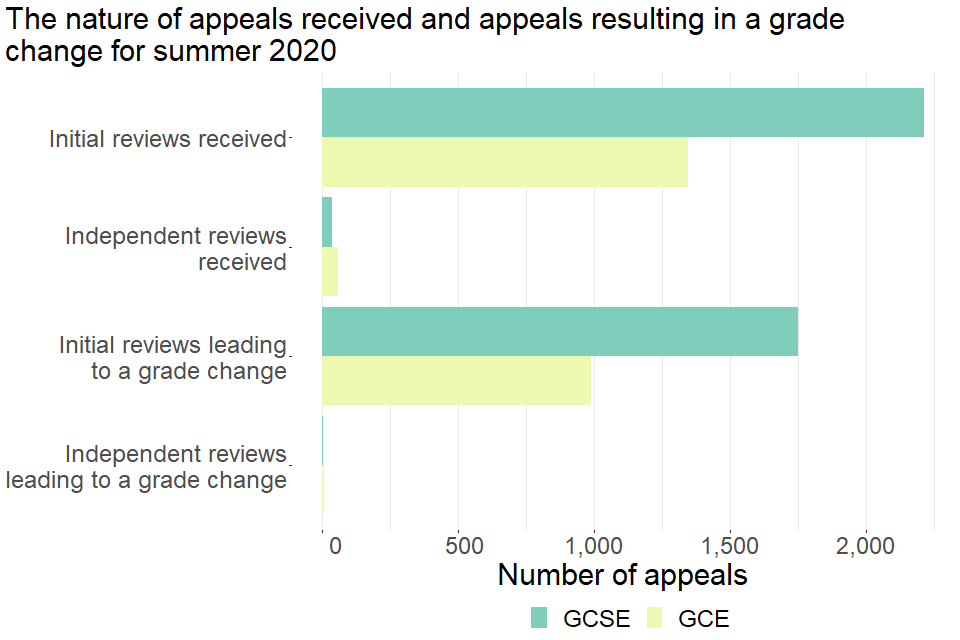
Table 5. The nature of appeals received and appeals resulting in a grade change for summer 2020
| Qualification level | Number of initial reviews | Number of independent reviews | Initial reviews leading to independent reviews | Initial reviews leading to a grade change | Independent reviews leading to a grade change |
|---|---|---|---|---|---|
| GCSE | 2,215 | 35 | 2% | 1,750 | 0~ |
| GCE | 1,350 | 60 | 4% | 990 | 5 |
At time of data submission, there was one GCE appeal that has been referred to the exam procedure review service.
5. Grades challenged and changed
A single appeal may represent one or more qualification grades which are being challenged, eg when a centre appeals its results for a moderated component taken by a number of its students. An upheld appeal may result in a change to all, some, or none of the associated qualification grades. Therefore, an increase or decrease in appeals received may not be mirrored in the number of grades challenged or changed.
Additionally, a candidate may be involved in more than one appeal. In summer 2020, there were 24,877 GCSE and GCE candidates whose grades were involved in an appeal. There were 4,650 (0.08%) of the approximately 6 million grades certified for these qualifications in summer 2020 that were changed as part of an upheld appeal. At the time when data was reported to Ofqual, there are currently 425 grades from upheld appeals where either the post appeal grade is yet to be determined or the original grade is unknown.
There were 27,825 grades challenged and 3,230 grades changed for GCSE and 3,630 grades challenged and 1,420 grades changed for GCE in summer 2020
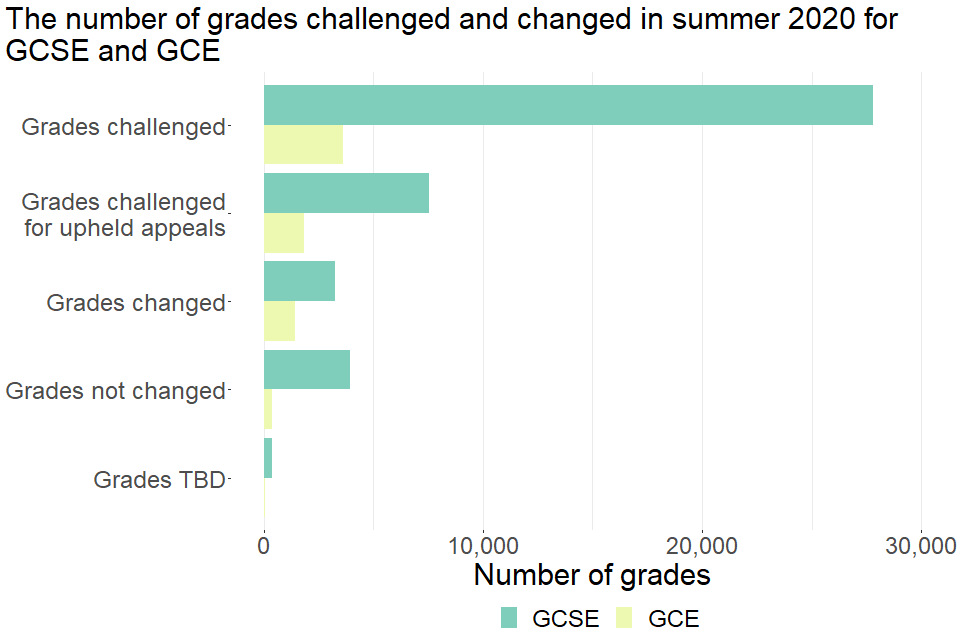
Table 6. The number of grades challenged and changed in summer 2020 for GCSE and GCE
| Qualification level | Grades challenged | Grades challenged for upheld appeals | Grades changed | Grades not changed | Grades TBD |
|---|---|---|---|---|---|
| GCSE | 27,825 | 7,540 | 3,230 | 3,930 | 375 |
| GCE | 3,610 | 1,840 | 1,420 | 370 | 50 |
6. Grades challenged at appeal in summer 2020
Grade 3 was the most contested grade for GCSE 9 to 1, grade 4-4 the most contested grades for GCSE: combined science and grade B the most contested grade for GCE
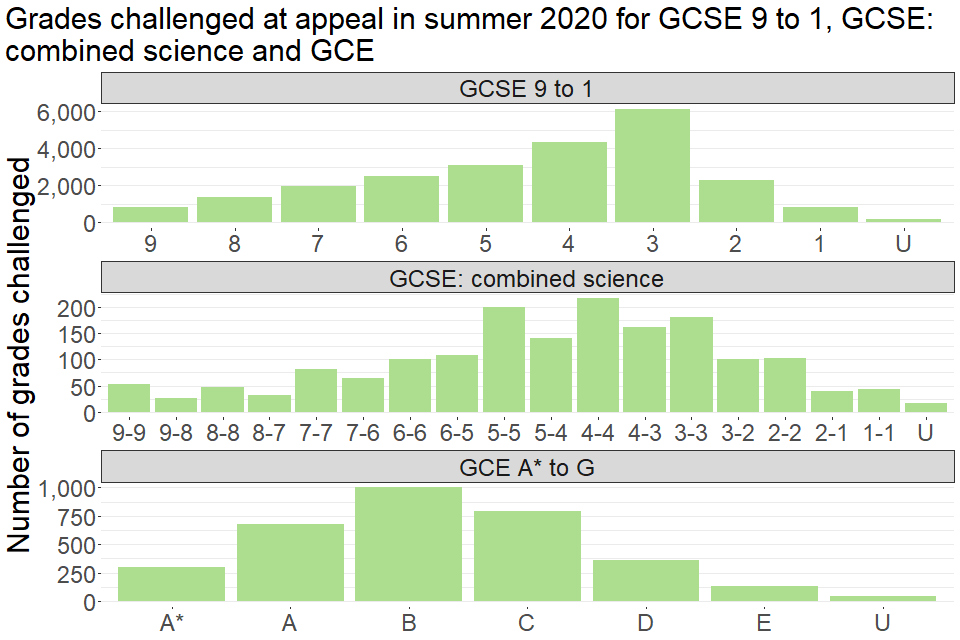
Source: Table 7: Data tables for appeals for GCSE, AS and A level: summer 2020
7. Grade changes for upheld appeals
The charts in this section show the magnitude of grade changes made following an upheld appeal in June 2020. A small number of upheld appeals were in respect of candidates who were not originally given a grade. Those cases do not appear in these graphs. These graphs also do not include candidates where the grades are yet to be determined after an appeal was upheld.
7.1 GCSE
Where an appeal was upheld and grades known, 45% of GCSE grades challenged had a grade change of one or more grade in summer 2020
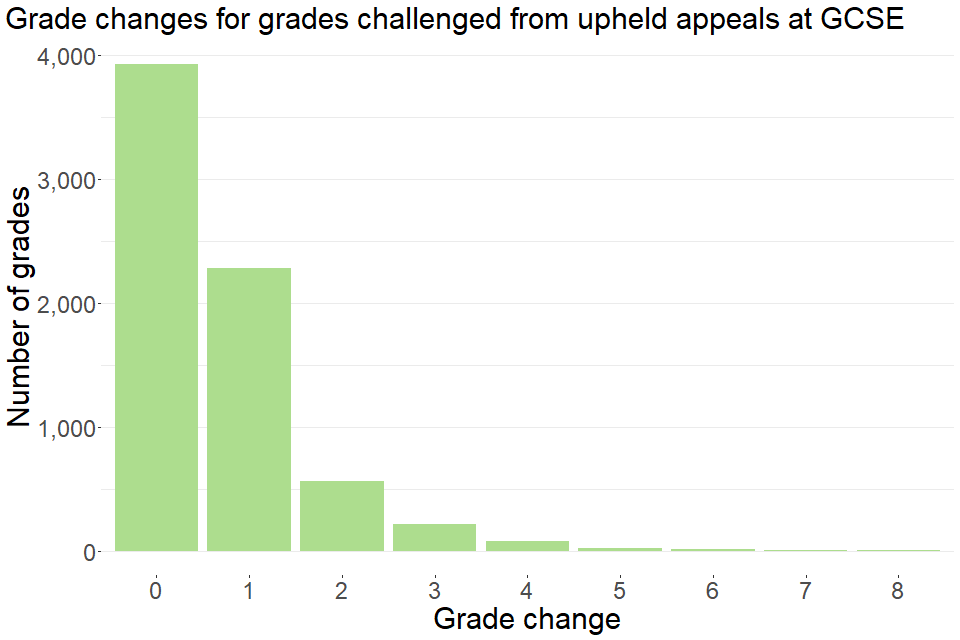
Table 7. Grade changes for grades challenged from upheld appeals at GCSE
| Grade change for upheld appeals | Number of grades | % of grades |
|---|---|---|
| 0 | 3,930 | 55 % |
| 1 | 2,285 | 32 % |
| 2 | 565 | 8 % |
| 3 | 210 | 3 % |
| 4 | 75 | 1 % |
| 5 | 25 | 0 % |
| 6 | 10 | 0 % |
| 7 | 0~ | 0 % |
| 8 | 0~ | 0 % |
Overall in upheld appeals (and where grades were known), 55% of GCSE grades challenged in upheld appeals did not result in a qualification grade change in summer 2020. Of the grades that changed, 32% changed by one grade and 13% resulted in a change of 2 or more grades.
As at 17 November 2020, there are 375 grades challenged for upheld appeals where grades are to be determined. These grades are not shown in the chart and table in this section.
7.2 GCE
Where an appeal was upheld and grades known, 79% of GCE grades challenged had a grade change of one or more grade in summer 2020
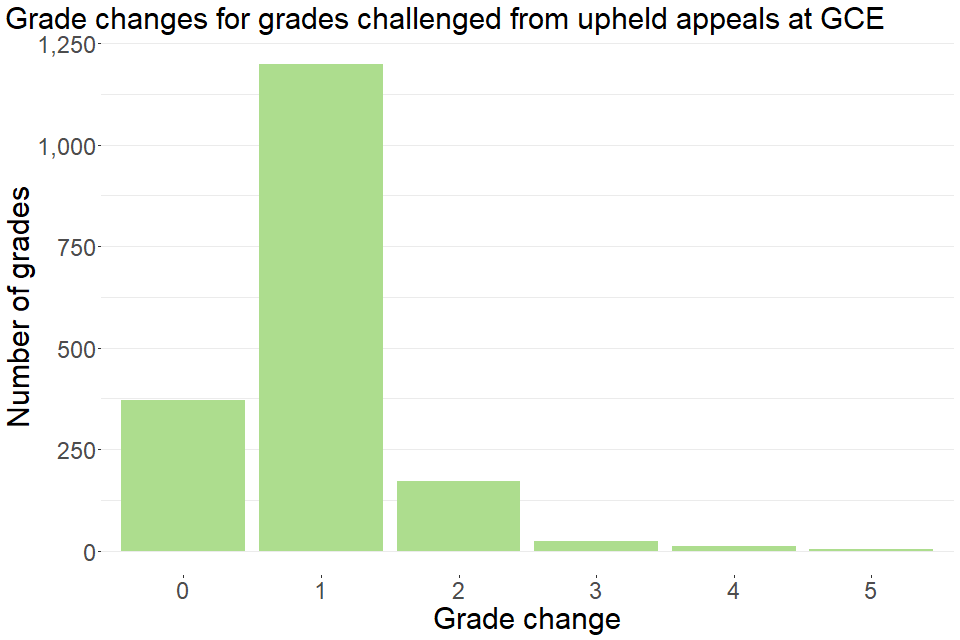
Table 8. Grade changes for grades challenged from upheld appeals at GCE
| Grade change for upheld appeals | Number of grades | % of grades |
|---|---|---|
| 0 | 370 | 21 % |
| 1 | 1,200 | 67 % |
| 2 | 170 | 10 % |
| 3 | 25 | 1 % |
| 4 | 10 | 1 % |
| 5 | 0~ | 0 % |
Overall in upheld appeals (and where grades were known), 21% of GCE grades challenged did not result in a qualification grade change in summer 2020. Of the grades that changed, 67% changed by one grade and 12% resulted in a change of 2 or more grades.
As at 17 November 2020, there are 50 grades challenged for upheld appeals where grades are to be determined. These grades are not shown in the chart and table in this section.
8. Appeals received by centre type
8.1 GCSE
For GCSEs the majority of appeals received, appeals upheld, grades challenged and changed were for secondary non-selective, maintained schools or centres
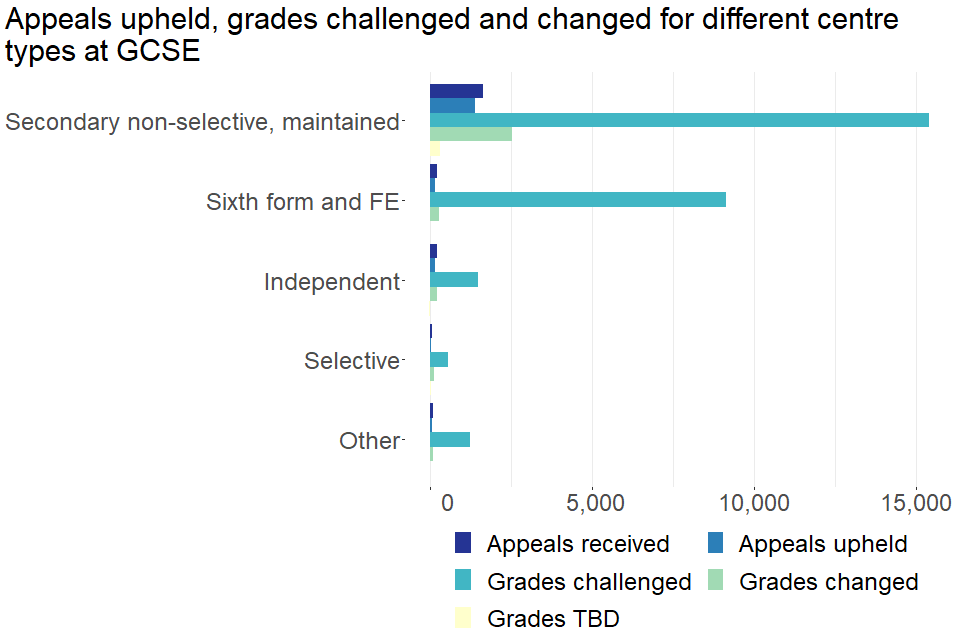
Table 9. Appeals upheld, grades challenged and changed for different centre types at GCSE
| Centre type | Appeals received | Appeals upheld | Grades challenged | Grades changed | Grades TBD |
|---|---|---|---|---|---|
| Secondary non-selective, maintained | 1,630 | 1,395 | 15,405 | 2,525 | 310 |
| Sixth form and FE | 215 | 160 | 9,135 | 265 | 0~ |
| Independent | 225 | 170 | 1,475 | 220 | 20 |
| Selective | 60 | 50 | 570 | 130 | 40 |
| Other | 85 | 60 | 1,235 | 90 | 5 |
8.2 GCE
For GCE the majority of appeals received, appeals upheld, grades challenged and changed were for secondary non-selective, maintained schools or centres
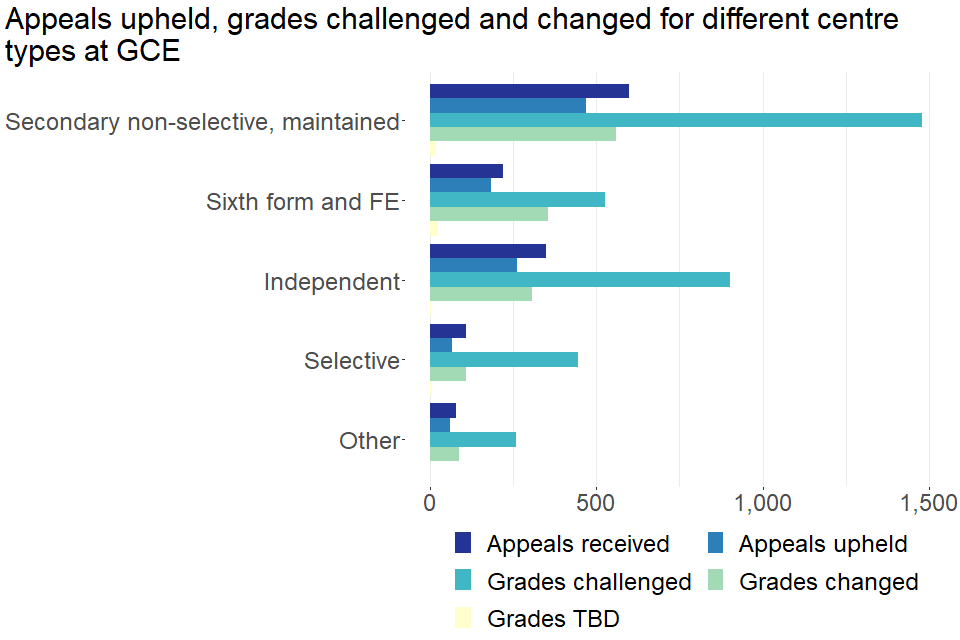
Table 10. Appeals upheld, grades challenged and changed for different centre types at GCE
| Centre type | Appeals received | Appeals upheld | Grades challenged | Grades changed | Grades TBD |
|---|---|---|---|---|---|
| Secondary non-selective, maintained | 600 | 470 | 1,480 | 560 | 20 |
| Sixth form and FE | 220 | 185 | 525 | 355 | 25 |
| Independent | 350 | 260 | 900 | 310 | 0~ |
| Selective | 110 | 65 | 445 | 110 | 5 |
| Other | 80 | 60 | 260 | 90 | 0~ |
9. Appeals received by region
9.1 GCSE
For GCSE the largest share of appeals received, appeals upheld, grades challenged and grades changed are from the South East and London
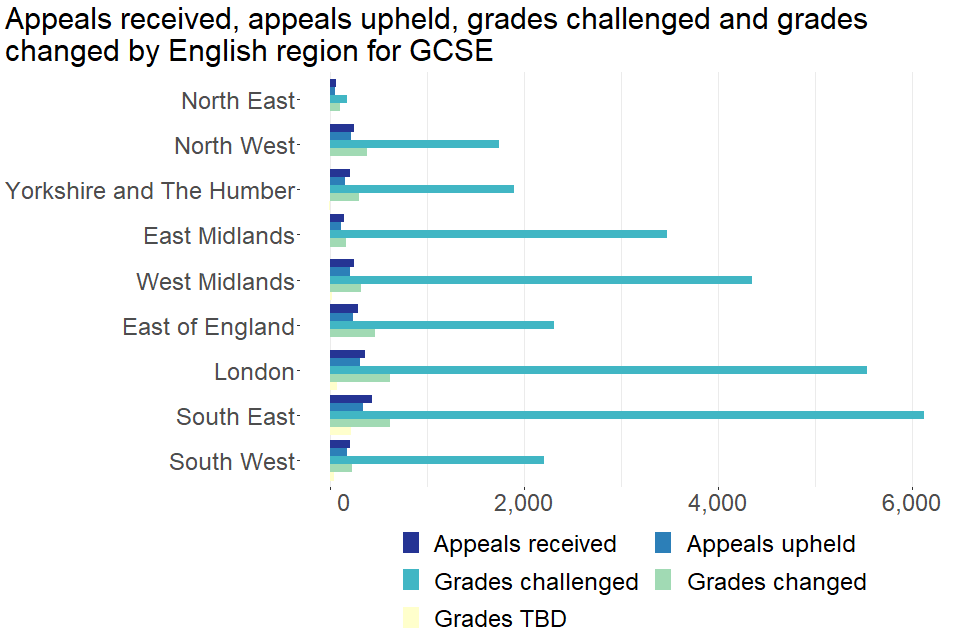
Table 11. Appeals received, appeals upheld, grades challenged and grades changed by English region for GCSE
| Region | Appeals received | Appeals upheld | Grades challenged | Grades changed | Grades TBD |
|---|---|---|---|---|---|
| North East | 65 | 60 | 175 | 110 | 0~ |
| North West | 255 | 225 | 1,750 | 390 | 5 |
| Yorkshire and The Humber | 205 | 155 | 1,900 | 305 | 5 |
| East Midlands | 145 | 115 | 3,470 | 165 | 0~ |
| West Midlands | 245 | 205 | 4,345 | 330 | 25 |
| East of England | 290 | 240 | 2,315 | 465 | 0~ |
| London | 370 | 315 | 5,535 | 615 | 70 |
| South East | 435 | 345 | 6,125 | 625 | 215 |
| South West | 205 | 175 | 2,210 | 230 | 45 |
9.2 GCE
For GCE the largest share of appeals received, appeals upheld, grades challenged and grades changed are from the South East and London
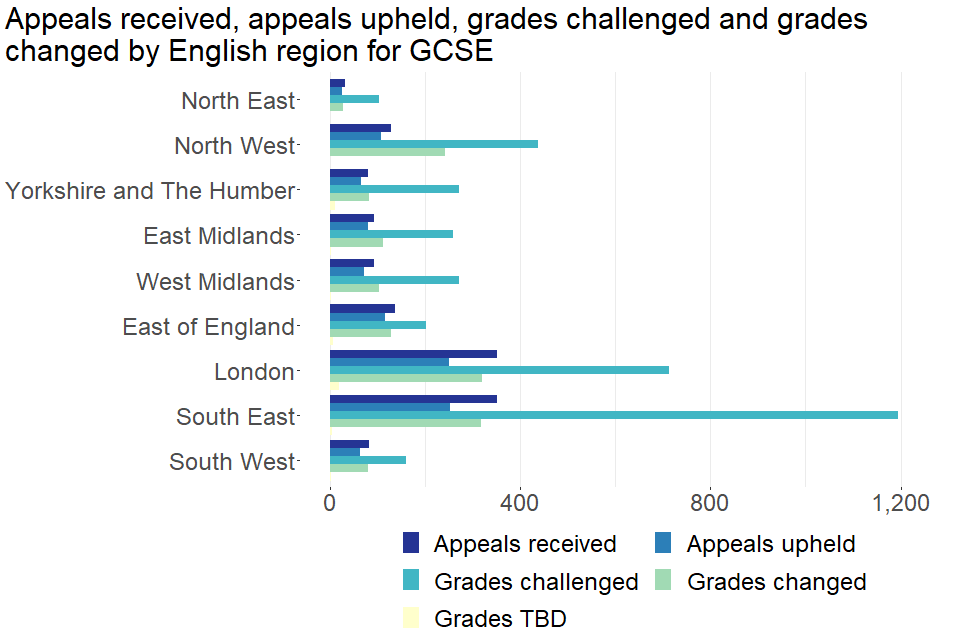
Table 12. Appeals received, appeals upheld, grades challenged and grades changed by English region for GCE
| Region | Appeals received | Appeals upheld | Grades challenged | Grades changed | Grades TBD |
|---|---|---|---|---|---|
| North East | 30 | 25 | 105 | 30 | 0~ |
| North West | 130 | 110 | 435 | 245 | 0 |
| Yorkshire and The Humber | 80 | 65 | 270 | 80 | 10 |
| East Midlands | 95 | 80 | 260 | 115 | 0~ |
| West Midlands | 95 | 75 | 270 | 105 | 0~ |
| East of England | 140 | 115 | 200 | 130 | 5 |
| London | 350 | 250 | 715 | 320 | 20 |
| South East | 350 | 255 | 1,195 | 320 | 5 |
| South West | 85 | 65 | 160 | 80 | 0~ |
10. Contextual information
This report presents data on requests for initial reviews and independent reviews made to exam boards for summer 2020. The qualifications covered in this report are GCSE and GCE (AS and A level) qualifications in England. The figures presented here are provisional from when data was submitted to Ofqual by the exam boards.
Appeals could be submitted by a school or college if they believed that an exam board did not apply its procedures properly and fairly or where the data used by the exam board to calculate results contained an error. Appeals were made at the subject level and, if related to the same issue, may cover more than one candidate. The Joint Council for Qualifications (JCQ) guide to the awarding bodies’ appeals process describes 2 steps for appeals:
-
An initial review, in which a suitable member of an exam board’s staff checked the relevant nature, procedure or process depending on the nature of appeal.
-
An independent review. If a centre was not satisfied with the outcome of the initial review, they had 14 calendar days from the outcome to request an independent review. The independent review was carried out by an independent decision maker (i.e. someone who has not been directly employed by the awarding body, was not be an examiner or moderator working for the awarding body and was not connected to the awarding body in any other way).
Due to the exceptional nature of the appeals process in summer 2020, direct comparisons of appeals in summer 2020 and previous years are not valid and need to be treated with caution.
Further information on this release is available in the background information as well as data tables accompanying this report.
11. User feedback
We welcome your feedback on our publications. Should you have any comments on this statistical release and how to improve it to meet your needs please contact us at data.analytics@ofqual.gov.uk.
Head of profession: Vikas Dhawan

